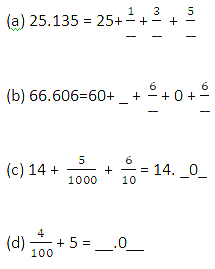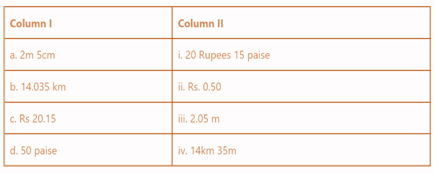Class 6 Maths
Decimals


Question 1.
Write the decimal number represented by the points S on the given number line.

Question 2:
Arrange the following decimal numbers in descending order.
8.51, 8.06, 9.10, 8.57
Question 3:
State True or False: -
(a) Rs. 70.25 can also expressed as 70Rs 25p.
(b)Adding 70.25 and 14.6 gives 84.85.
(c)1 kg is equals to 10 grams.
(d)Expanded form of 23.05 is 
Question 4:
Show 1.1 on the number line.
Question 5:
Subtract the sum of 114.753 and 70.14 from the sum of 93.12 and 212.15.
Question 6:
Express each of the following in terms of litres (L) using decimals:
(a) 625 mL
(b) 760 mL
(c) 11 L 125 mL
(d) 7 L 350 mL
Question 7:
Fill in the blanks:

Question 8:
Write the following in decimals.

Question 9:
Write the following as decimals.
(a) Three tens and eight-tenths
(b) Fifteen point seven
Question 10:
Write as fractions in lowest form.
(a) 0.05
(b) 20.25
Question 11:
Represent 1.3,3.8 and 4.1 on the number line.
Question 12:
Write 3.03, 2.75 and 2.5 in ascending order.
Question 13:
Ten years old Rahul can carry a maximum weight of 15 kg. If he bought 4 kg 900 g of apples, 2 kg 600 g of grapes and 5 kg 300 g of mangoes. Can he carry the total weight that he bought. If yes, then how much more weight he can carry with him?
Question 14:
Match the following:

Question 15:
Find the value of the following:
(а) 15 – 9.363
(b) 5.28 – 1.4 + 3.116
Question 16:
Write the following in decimals.
5 hundreds 3 tens 8 ones 4 tenths
Question 17:
Write the following as decimals.

Question 18:
Express the following as rupees using decimals:
(a) 30 paise
(b) 9250 paise
Question 19:
Convert the following unlike decimals into like decimals:

Question 20:
Write each of the decimals as a mixed fraction.
(a) 95.8
(b) 15.78
Question 21:
Write in decimals:

**********
In summary, problem-solving after learning a theoretical concept on CBSE Decimals Class 6 Maths is an essential part of the learning process. It enhances your understanding, critical thinking abilities, and retention of knowledge. Moreover, it equips you with valuable skills that are applicable in academic, personal, and professional contexts.
You must have heard of the phrase “Practice makes a man perfect”. Well, not just a man, practice indeed enhances perfection of every individual.
Practicing questions plays a pivotal role in achieving excellence in exams. Just as the adage goes, "Practice makes perfect," dedicating time to solve a diverse range of exam-related questions yields manifold benefits. Firstly, practicing questions allows students to familiarize themselves with the exam format and types of problems they might encounter. This familiarity instills confidence, reducing anxiety and improving performance on the actual exam day. Secondly, continuous practice sharpens problem-solving skills and enhances critical thinking, enabling students to approach complex problems with clarity and efficiency. Thirdly, it aids in identifying weak areas, allowing students to focus their efforts on improving specific topics. Moreover, practice aids in memory retention, as active engagement with the material reinforces learning. Regular practice also hones time management skills, ensuring that students can allocate appropriate time to each question during the exam. Overall, practicing questions not only boosts exam performance but also instills a deeper understanding of the subject matter, fostering a holistic and effective learning experience.
All About Daily Practice Problems on Class 6 Maths Decimals NCERT Chapter 8
Our Daily Practice Problems (DPPs) offer a diverse range of question types, including Multiple Choice Questions (MCQs) as well as short and long answer types. These questions are categorized into Easy, Moderate, and Difficult levels, allowing students to gradually progress and challenge themselves accordingly. Additionally, comprehensive solutions are provided for each question, available for download in PDF format - Download pdf solutions as well as Download pdf Questions. This approach fosters a holistic learning experience, catering to different learning styles, promoting self-assessment, and improving problem-solving skills. With our well-structured DPPs, students can excel in exams while gaining a deeper understanding of the subject matter. Hope you found the content on Class 6 Maths Decimals NCERT Chapter 8 useful.
Last but not least, to get the best hold on Class 6 Maths Decimals NCERT Chapter 8, do not forget to check out: